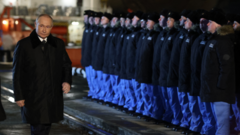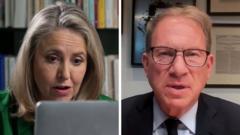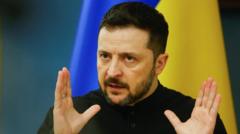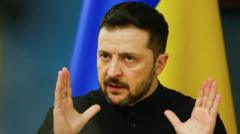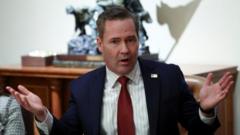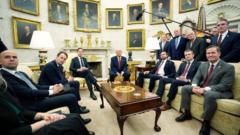A flight carrying 199 Venezuelan deportees has resumed the US-Venezuela repatriation flights after a previous halt due to disputes over oil sanctions. Venezuelan President Nicolás Maduro emphasized the humanitarian aspect of the flights while US authorities classified the individuals as undocumented migrants without legal standing in the US.
US and Venezuela Reach Agreement to Resume Deportations

US and Venezuela Reach Agreement to Resume Deportations
A contentious agreement between the US and Venezuela sees the return of deportees, marking a turning point in immigration policies.
A flight carrying 199 Venezuelans deported from the United States has successfully landed at Simón Bolívar airport, Caracas, marking the resumption of repatriation flights between the two countries. These flights had ceased weeks earlier following the Trump administration’s decision to revoke a license allowing Venezuela’s oil exports to the US, a move that complicated diplomatic communications.
After negotiations on Saturday, the Biden administration and the Venezuelan government, which currently lack formal diplomatic ties, agreed to resume these deportation flights as part of an extensive plan aimed at addressing undocumented immigration issues. Venezuelan President Nicolás Maduro characterized the flights as a means to “rescue and free migrants from prisons in the US,” positioning himself as a leader advocating for citizens’ rights on an international stage.
The deportees arrived in Venezuela after being transported from Texas to Honduras, then flown by Venezuela’s state airline, Conviasa. The US Bureau of Western Hemisphere Affairs identified them as “illegal aliens” with no entitlement to remain in the country. Conversely, Venezuelan National Assembly leader Jorge Rodríguez reinforced the perspective that migration should not be labeled as a crime.
The arrangement for repatriating Venezuelan citizens was initially set in motion earlier this year by Trump’s special envoy, Richard Grenell, but subsequent actions, such as the sanctions that limited Chevron's operations in Venezuela, had created obstacles to this agreement. Maduro expressed his frustration regarding these sanctions, stating they hindered previously established communication channels meant to facilitate deportations
Last week, notable tensions escalated following the unacceptable deportation of hundreds of Venezuelans to El Salvador, where they were held in notorious prisons linked to organized crime allegations. This action incited public outrage in Venezuela, with relatives of the deported claiming their loved ones were innocent. In a stark response to these actions, US Secretary of State Marco Rubio warned of “severe and escalating” sanctions if Venezuela resisted further repatriation efforts.
In light of this complex situation, President Maduro has directed his government to enhance actions that would ensure the safe return of detainees seeking to repatriate, marking a potential shift toward a more cooperative framework for addressing migration between the two nations.

